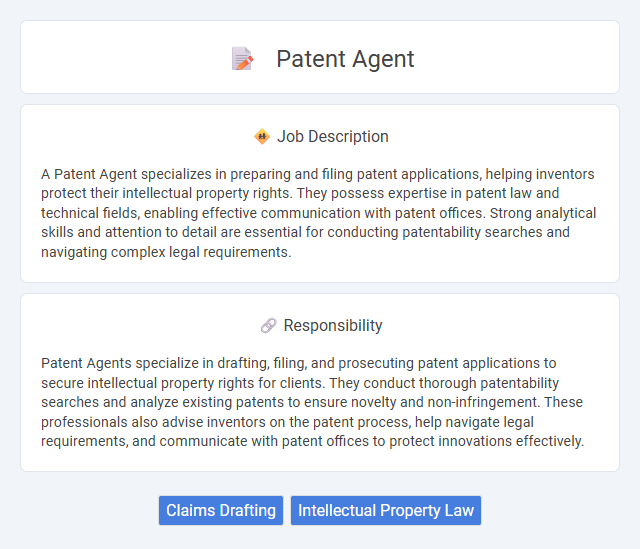
A Patent Agent specializes in preparing and filing patent applications, helping inventors protect their intellectual property rights. They possess expertise in patent law and technical fields, enabling effective communication with patent offices. Strong analytical skills and attention to detail are essential for conducting patentability searches and navigating complex legal requirements.
Individuals with strong analytical skills and attention to detail are likely suitable for a Patent Agent role, as the job involves interpreting complex technical information and legal regulations. People who enjoy research, problem-solving, and have a background in science or engineering may find this career fulfilling. Those who prefer less structured tasks or have limited interest in legal documentation might struggle to adapt to the demands of this profession.
Qualification
A Patent Agent must possess a strong background in science, technology, or engineering, often demonstrated by a degree in fields such as biology, chemistry, physics, or mechanical engineering. Passing the United States Patent and Trademark Office (USPTO) registration exam is essential to practice, ensuring proficiency in patent law and application procedures. Strong analytical skills, attention to detail, and knowledge of intellectual property regulations are critical qualifications for effectively preparing and prosecuting patent applications.
Responsibility
Patent Agents specialize in drafting, filing, and prosecuting patent applications to secure intellectual property rights for clients. They conduct thorough patentability searches and analyze existing patents to ensure novelty and non-infringement. These professionals also advise inventors on the patent process, help navigate legal requirements, and communicate with patent offices to protect innovations effectively.
Benefit
Working as a Patent Agent likely provides strong intellectual property expertise, increasing career flexibility and demand in technology-driven industries. The role probably offers competitive salaries and opportunities for advancement, benefiting those with a technical or legal background. It may also enable professionals to protect innovations, contributing to business growth and personal job satisfaction.
Challenge
The role of a Patent Agent likely involves navigating complex legal and technical challenges to secure intellectual property rights effectively. There may be frequent situations where interpreting evolving patent laws and handling intricate invention disclosures pose significant difficulties. Managing tight deadlines alongside thorough patent application preparation could also present ongoing professional challenges.
Career Advancement
Patent agents play a crucial role in intellectual property law by preparing and prosecuting patent applications, offering a pathway for career advancement into senior patent agent, patent attorney, or intellectual property counsel roles. Specialized knowledge in patent law and technical expertise in fields such as biotechnology, engineering, or computer science enhances prospects for promotion and leadership positions within law firms or corporate legal departments. Continuous professional development and passing the patent bar exam are essential steps for progressing to higher-level responsibilities and expanded client advisory roles.
Key Terms
Claims Drafting
Patent agents specializing in claims drafting play a critical role in safeguarding intellectual property by precisely defining the scope of patent protection. Mastery of technical terminology and an in-depth understanding of patent law are essential for crafting claims that effectively cover innovations while minimizing infringement risks. Expertise in claims drafting enhances the enforceability of patents and supports innovation across industries such as technology, pharmaceuticals, and engineering.
Intellectual Property Law
A Patent Agent specializes in Intellectual Property Law by preparing, filing, and prosecuting patent applications to protect inventions and innovations. They conduct patentability searches, analyze prior art, and advise clients on the scope and enforcement of patent rights. Expertise in both technical fields and legal standards is essential to navigate complex patent regulations and safeguard intellectual property assets.
 kuljobs.com
kuljobs.com